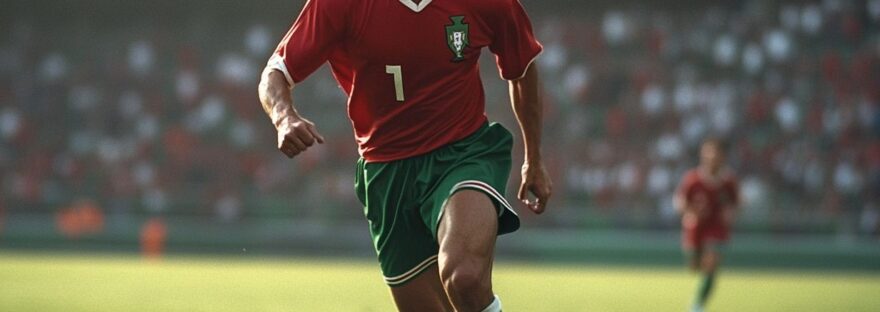Cristiano Ronaldo, one of the most celebrated athletes in history, has an extraordinary journey that began long before he became a household name.
This piece explores the compelling biography and early career of this soccer icon. From his humble beginnings and family influences to his rise through youth clubs and his pivotal move to Manchester United, we uncover the key moments that shaped his path to greatness.
Join us as we chronicle Ronaldo’s formative years and the foundations of his legendary career.
Who Is Cristiano Ronaldo?
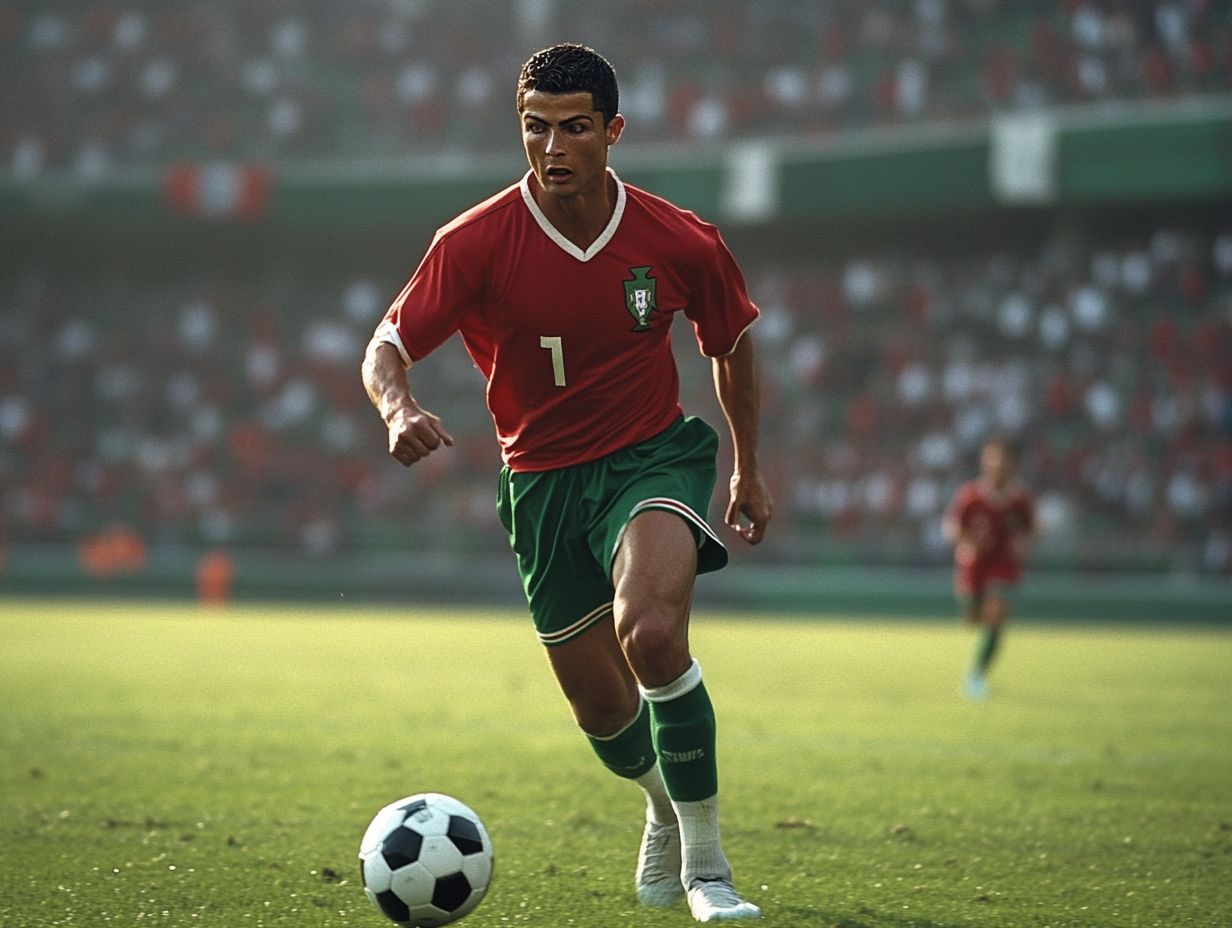
Cristiano Ronaldo is a distinguished Portuguese soccer player, widely recognized as one of the greatest athletes in history. He is celebrated for his exceptional skills, unwavering dedication, and an impressive record of accomplishments that includes numerous individual awards and trophies with elite clubs.
Born in Funchal, Madeira, Ronaldo’s early life was characterized by a modest upbringing that fostered a strong work ethic and an ambitious mindset, both of which would later play a pivotal role in his soccer career. Raised in a close-knit family, he was encouraged to pursue his passion for football from a young age, often playing in local streets and fields.
The challenges he faced while growing up in a small island community shaped him into a formidable competitor, instilling a resilience that has served him well on the global stage.
As he progressed from local teams to international acclaim, his connection to his roots remained a significant influence, impacting both his athletic journey and his identity as a public figure.
Quick Facts
Cristiano Ronaldo’s life is characterized by an array of remarkable achievements, including multiple victories of the Ballon d’Or, holding the record as the all-time top scorer for the UEFA Champions League, and accumulating a wealth of trophies with prestigious clubs such as Manchester United, Real Madrid, and Juventus.
His unwavering dedication to the sport has not only established him as a household name but also positioned him as a source of inspiration for many aspiring athletes worldwide. Ronaldo’s exceptional skills on the field are further enhanced by a rigorous work ethic and a commitment to maintaining peak physical fitness, which has significantly contributed to his longevity in professional football.
Beyond his athletic accomplishments, he is recognized for his philanthropic efforts, which include substantial donations to children’s hospitals and cancer research initiatives.
Key facts about this football legend include:
- Birth Date: February 5, 1985
- Career Goals: Over 800 goals in competitive matches
- Major Awards: 5 Ballon d’Or titles, 4 European Golden Shoes
- Personal Life: A father to four children; his mother has battled cancer
- Philanthropy: Established the CR7 Foundation, which focuses on health and education initiatives.
Early Life
Cristiano Ronaldo’s early life in Funchal, Madeira, significantly influenced his character and determination. Born into a modest family, he encountered various challenges, including a heart condition that nearly undermined his soccer aspirations at a young age.
Birth and Family Background
Cristiano Ronaldo was born on February 5, 1985, in Funchal, Madeira, to José Dinis Aveiro and Maria Dolores dos Santos. The modest background of his parents and their profound commitment to family significantly influenced the formation of his values and determination.
Raised in a close-knit household, Ronaldo’s parents emphasized the importance of hard work and perseverance. His father, who worked as a kit man at a local football club, often recounted stories of teamwork and dedication, which ignited his son’s passion for soccer. Concurrently, his mother, employed as a cook, played a pivotal role in nurturing his aspirations, frequently transporting him to practice sessions despite their limited resources.
A notable anecdote reflects her steadfast belief in his abilities; during challenging moments, she would remind him that every champion begins as an underdog, encouraging him to pursue his ambitions with unwavering resolve.
Childhood Environment and Influences
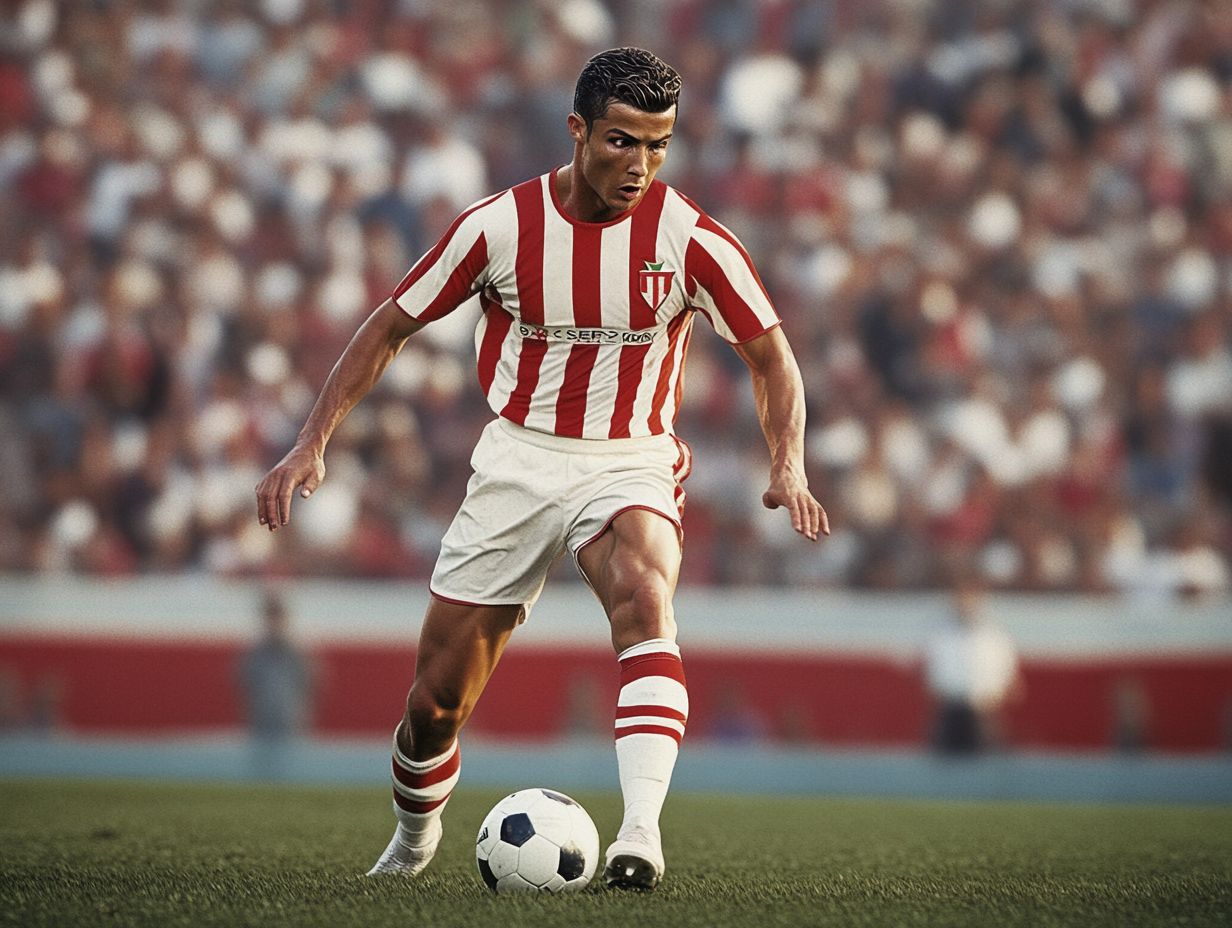
Growing up in a modest neighborhood in Funchal, Cristiano Ronaldo encountered various challenges; however, he was also surrounded by influences that nurtured his passion for soccer, including local mentors and a supportive family environment.
This environment, though marked by economic struggles, fostered a tight-knit community where young aspiring athletes frequently found inspiration. Local coaches played a pivotal role by providing mentorship that helped shape his skills and instill discipline from an early age.
Additionally, Ronaldo’s family served as a cornerstone of his development; they encouraged his dreams despite financial hardships, often sacrificing personal comforts to provide him with opportunities to play.
This combination of community support and familial dedication not only ignited his ambition but also laid the foundation for his future successes on the global stage.
Early Soccer Career
Cristiano Ronaldo’s early soccer career was characterized by notable achievements and challenges as he developed his skills in various youth clubs. This journey culminated in a pivotal transfer to Sporting Lisbon, where his development progressed at an accelerated pace.
Youth Clubs and Development
Ronaldo played for several youth clubs in Madeira, where he developed his soccer skills and established a strong foundation for future success through rigorous training and competitive play.
Among these clubs, the most notable were Andorinha, where he commenced his journey, and Nacional, where he enhanced his abilities in a more structured environment. During these formative years, he acquired essential techniques such as dribbling, shooting, and tactical awareness, guided by seasoned coaches who recognized his potential. The competitiveness he encountered not only strengthened his physical attributes but also fostered a comprehensive understanding of the game.
This combination of innate talent and relentless determination clearly indicated that he was destined for greatness, effectively paving the way for his subsequent transition to Sporting Lisbon’s prestigious academy, where he would further refine his skills.
Move to Sporting Lisbon
The transition to Sporting CP represented a significant turning point in Cristiano Ronaldo’s early soccer career, as he joined the esteemed youth academy renowned for its exceptional training and mentorship. This critical step provided him not only with outstanding coaching but also immersed him in a competitive environment that fostered his skills and cultivated a strong work ethic.
Under the guidance of experienced professionals and alongside other promising young talents, he refined his abilities, which would later prove instrumental in shaping his distinctive playing style. The rigorous training sessions, combined with a strong emphasis on teamwork and discipline, were essential in preparing him for the professional realm, ultimately establishing a solid foundation for his ambitious career aspirations on the global stage.
Breakthrough at a Young Age
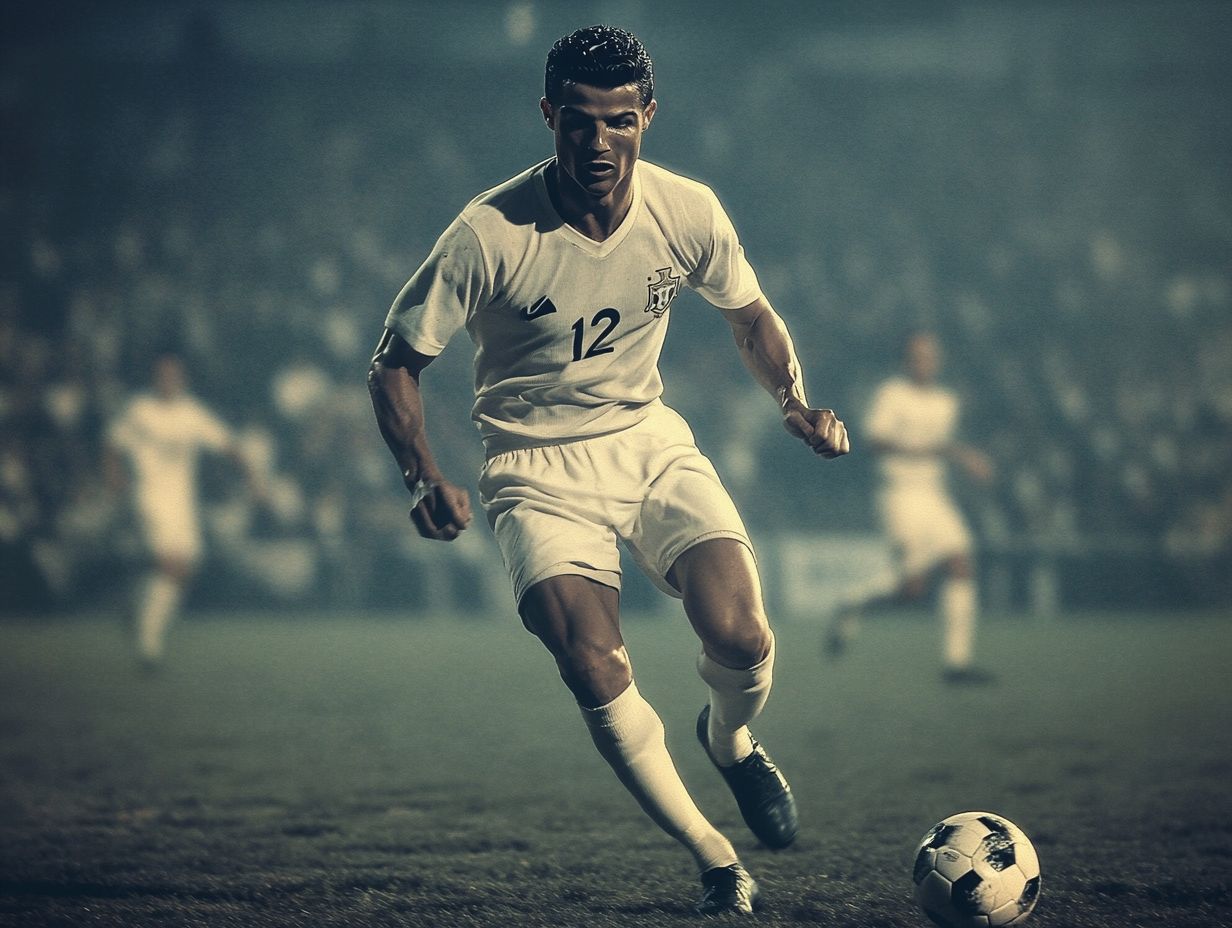
Cristiano Ronaldo achieved a significant breakthrough at a remarkably young age, demonstrating his exceptional talent and skills during matches, which captured the attention of scouts and paved the way for his future success in professional soccer.
A pivotal moment in his early career occurred during a youth tournament, where he captivated spectators with an impressive performance, scoring multiple goals and assisting his teammates. This display showcased not only his individual capabilities but also his commitment to team play.
His contributions did not go unnoticed; shortly thereafter, several Portuguese clubs expressed interest in acquiring his services, underscoring his potential. Recognition came swiftly, as he was awarded the prestigious Golden Boot for his remarkable scoring ability that season, further enhancing his reputation.
As the pressure increased, he consistently met the challenge, leaving both fans and coaches in admiration of his proficiency on the field.
Professional Career Beginning
Cristiano Ronaldo’s professional career commenced with a significant transfer to Manchester United, where he rapidly distinguished himself as a vital player. His contributions had a profound impact on the team, leading to notable achievements and success.
Joining Manchester United
In August 2003, Cristiano Ronaldo transferred to Manchester United for a then-record fee for a teenager, making his debut shortly thereafter and quickly capturing the attention of fans with his remarkable skills and flair on the pitch.
The transfer fee of approximately £12.24 million not only highlighted the potential recognized in this young talent but also set the foundation for one of football’s most iconic careers. On August 16, 2003, he took the field for the first time in a Premier League match against Bolton Wanderers, demonstrating exceptional footwork and remarkable speed.
His initial performances were met with admiration and enthusiasm from supporters and teammates alike, as they witnessed glimpses of the extraordinary abilities that would later establish him as a household name worldwide. Fans were instantly captivated by his dynamic presence, which proved to be a significant asset to the team’s attacking strategy.
Impact and Achievements
During his tenure at Manchester United, Cristiano Ronaldo made a significant impact, contributing to the club’s success by securing multiple trophies, including the Premier League and the Champions League, while also receiving numerous individual accolades for his outstanding performances.
His presence on the pitch not only enhanced the team’s performance but also inspired both fellow teammates and fans. The iconic number 7 became a symbol of excellence as he earned prestigious titles, including the FIFA World Player of the Year and the Ballon d’Or during his time with the club.
These accomplishments solidified his status as a global superstar, characterized by an exceptional skill set that included remarkable speed, agility, and a keen eye for goal. This impressive period at Manchester United undeniably contributed to his legacy, reinforcing the argument that he ranks among the greatest players in soccer history and leaving a lasting impact on both the club and the sport.
Transition to Global Stardom
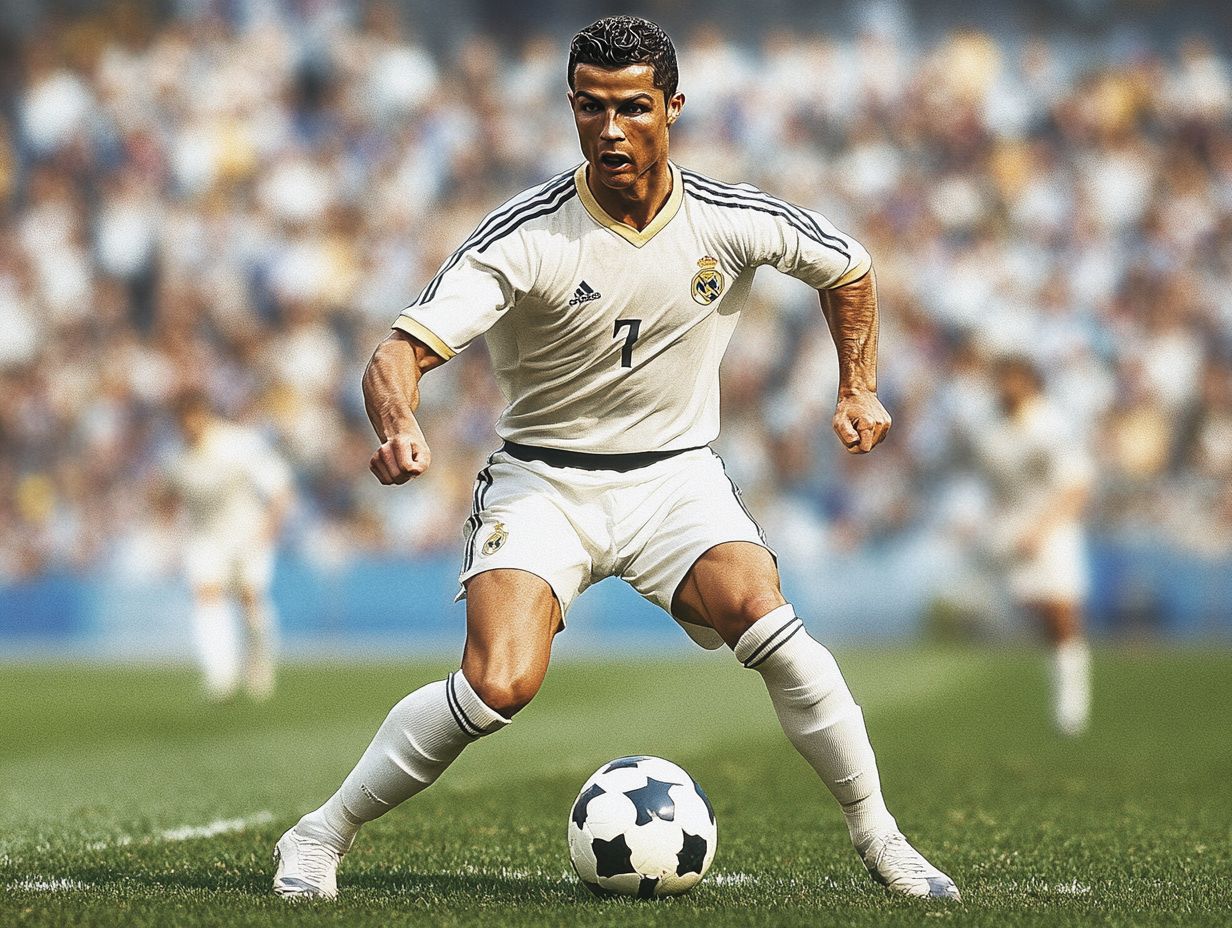
Cristiano Ronaldo’s ascent to global stardom commenced with his significant transfer to Real Madrid, where he not only set numerous records but also established himself as an international icon of the sport.
Move to Real Madrid
In 2009, Cristiano Ronaldo executed a high-profile transfer to Real Madrid, signing a six-year contract that initiated one of the most successful phases of his career. This significant move followed an impressive tenure at Manchester United, where he established himself as one of the premier football talents on a global scale.
The transfer fee, reported to be approximately €94 million, shattered previous records and highlighted the immense expectations placed upon him by the club and its dedicated supporters. Upon his arrival, he was immediately tasked with enhancing the team’s competitive standing in La Liga and the UEFA Champions League.
His exceptional skills on the pitch were expected to usher in a new era of success for Real Madrid, as he arrived with a relentless drive and a strong desire for achievement that quickly positioned him as a central figure in the club’s ambitious objectives.
Record-Breaking Performances
At Real Madrid, Cristiano Ronaldo achieved numerous records, including becoming the all-time top scorer in the UEFA Champions League. His remarkable goal-scoring ability and consistent performance significantly contributed to the club’s success.
During his tenure with the club, Ronaldo not only rewrote the record books with an impressive tally of goals in both domestic and international competitions but also led the team to numerous prestigious trophies. His capacity to deliver outstanding performances in high-pressure situations established him as an invaluable asset to Real Madrid.
Along with individual accolades, including winning the Ballon d’Or four times while representing the club, his contributions were instrumental in solidifying Madrid’s status as a dominant force in European football. This combination of personal and team success has greatly enriched his legacy, ensuring that he will be remembered as one of the greatest athletes in the history of the sport.
Current Status in Soccer
As of 2023, Cristiano Ronaldo is currently playing for Al Nassr in Saudi Arabia, where he continues to demonstrate exceptional performance, further solidifying his status as a global soccer icon.
At Al Nassr, Ronaldo has not only exhibited his remarkable skills on the field but has also generated significant attention for the Saudi Pro League, attracting both fans and media interest. His ability to score goals and deliver crucial assists underscores why he remains one of the premier players in the world, even in the later stages of his career.
Soccer analysts and enthusiasts worldwide frequently engage in discussions regarding his contributions, emphasizing their impact on the team’s success and the increased competitiveness of the league. Many regard him as an ambassador for the sport, inspiring a new generation of players while consistently demonstrating an unparalleled work ethic and a deep passion for the game.
Influence on Future Generations
Cristiano Ronaldo’s influence transcends the soccer field; he serves as a mentor and source of inspiration for aspiring athletes, exemplifying the importance of dedication, skill, and philanthropy in effecting positive change.
Through his exemplary work ethic and commitment to personal growth, he embodies the values of resilience and determination, thereby encouraging young individuals to pursue their dreams with unwavering resolve.
By actively supporting various charitable initiatives, including youth programs and health campaigns, he highlights the significance of giving back to the community.
Ronaldo’s dedication to excellence and teamwork resonates profoundly, inspiring the next generation to adopt similar principles.
His presence in media and social platforms amplifies these messages, clearly indicating that greatness is not solely defined by athletic ability but also by one’s character and contributions to society.
